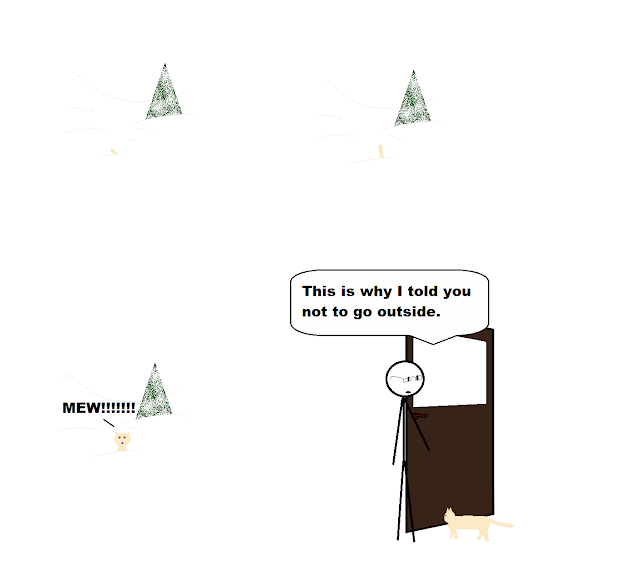Saturday, February 26, 2022
Thursday, February 24, 2022
Language Of Confusion: Tools
Tool comes from the Old English tol, which means an instrument or implement—so a tool. It’s from the Proto Germanic towalan. That’s really all that’s known about the origin of tool, but it’s worth noting that tool as slang for penis showed up in the 1550s, and I just found it so amusing that it’s that old.
Hammer comes from the Old English hamor, which, no big surprise, just means hammer, they’ve probably needed things to hit other things since the dawn of humanity. It’s from the Proto Germanic hamaraz, which might be from the Proto Indo European ka-mer-, from akmen, a sharp stone used as a tool. It does make perfect sense that hammer would be from there, but you know how these etymologies can be. It’s just as likely to be completely unrelated.
Can’t do hammer without doing nail. It comes from the Old English naegel, nail, and yes, that is where the nail part of fingernail comes from, too. It’s from the Proto Germanic naglaz, from the Proto Indo European (o)nogh, which meant a fingernail. Yes, fingernail is the original, while the metal spike came later! Which makes sense since we had fingers long before we needed metal nails.
Of course, the saw you use to cut would is not related to if you saw something with your eyes. The cutting tool comes from the Middle English saue and Old English sagu, from the Proto Germanic sago, and the Proto Indo European root sek-, to cut. And for some reason we also made the past tense of to see saw, because English is stupid.
Screw showed up in the fifteenth century (an actual date! Vague as it might be), coming from the Old French escröe/escroue, a cylindrical socket. It’s origins before there aren’t really known as there are several similar words in other languages, but the fact that Vulgar Latin has scrobis, which means a “screw-head groove”, and also a trench in classical Latin, kind of makes me lean toward that as an origin. Though I’m amused and horrified that some people think it’s from the Latin scrofa, which means sow, because a screw apparently looks like a pig’s penis, and why is this the second time I’ve had to type that word this week?
Online Etymology Dictionary
Google Translate
Omniglot
University of Texas at Austin Linguistic Research Center
University of Texas at San Antonio’s page on Proto Indo European language
University of Texas at Arlington
Tony Jebson’s page on the Origins of Old English
Old English-English Dictionary
Encyclopaedia Britannica
Tuesday, February 22, 2022
From The Spamfiles
Saturday, February 19, 2022
What Usually Happens
Thursday, February 17, 2022
Language Of Confusion: Floral
This week, we’re looking at flower, and words related to it. I guess
this is kind of Vegetation, Part III.
Online
Etymology Dictionary
Google Translate
Omniglot
University of Texas at Austin Linguistic Research Center
University of Texas at San Antonio’s page on Proto Indo European language
Tony Jebson’s page on the Origins of Old English
Old
English-English Dictionary
Tuesday, February 15, 2022
From The Spamfiles
Saturday, February 12, 2022
Thursday, February 10, 2022
Language Of Confusion: Vegetation, Part II
Online Etymology Dictionary
Google Translate
Omniglot
University of Texas at Austin Linguistic Research Center
University of Texas at San Antonio’s page on Proto Indo European language
Tony Jebson’s page on the Origins of Old English
Old English-English Dictionary
Tuesday, February 8, 2022
From The Spamfiles
Okay these don’t even look like letters. What the hell. I have to Thecl Nour Uccounl for my Clols of Begas Tasino Banout Berification.
Saturday, February 5, 2022
Thursday, February 3, 2022
Language Of Confusion: Vegetation, Part I
Online Etymology Dictionary
Google Translate
Omniglot
University of Texas at Austin Linguistic Research Center
University of Texas at San Antonio’s page on Proto Indo European language
Tony Jebson’s page on the Origins of Old English
Old English-English Dictionary
Dictionary of Medieval Latin
Encyclopaedia Britannica
Fordham University
Tuesday, February 1, 2022
February Goals
1. Actually work on the beta reading notes I have, and of course get more people to look at it.
HA HA HA HA HA HA no. Every time I tried I was just like, UGHHHHH, this is terrible, why bother?
HA HA HA HA HA HA HA HA. I know I should, but for some reason I just couldn’t make myself sit down and do it.
Well, I suppose I at least did this, although to my eternal frustration I cannot get the formatting right. It used to come out PERFECT in old blogger, and I could just copy it from an Excel spreadsheet and use the paragraph button to adjust the spacing. Now, NEITHER of those things are possible, because new blogger is out to get me and specifically me.
1. Actually do the editing notes for my new WIP. I really want to do this so I can start sharing it, because I honestly have no idea what to do with it and need some advice.








